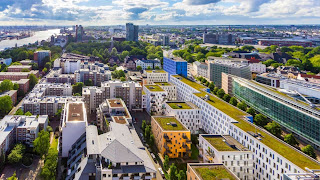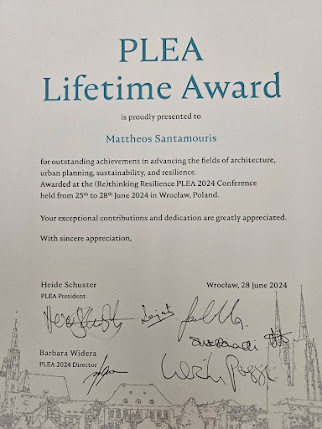Όταν έγινε το μεγάλο πυρηνικό δυστύχημα στη Φουκουσίμα, αυτοί που γνώριζαν καλά τα πράγματα από τότε, αναγνώρισαν ότι δεν επρόκειτο παρά για μια προσωρινή αναστολή της πορείας της εξάπλωσης της πυρηνικής ενέργειας. Ήξεραν ότι τα κεφάλαια, οι αγορές και οι μηχανισμοί που είχαν στη διάθεσή τους οι υποστηρικτές της βιομηχανίας της πυρηνικής ενέργειας, θα δούλευαν με σχέδιο για να την επαναφέρουν στο προσκήνιο.
Το σχέδιο, είχε ήδη γίνει φανερό αρκετά νωρίτερα: η καλύτερη ευκαιρία που μπορούσαν να δημιουργήσουν για να ενισχύσουν τη θέση τους και να εξασφαλίσουν επάνοδο, ήταν προκαλώντας καθυστέρηση στην απαιτούμενη κλιματική δράση για την ουσιαστική αντιμετώπιση της κλιματικής κρίσης.
Thursday, December 26, 2024
Η καλή πυρηνική ενέργεια και άλλες χριστουγεννιάτικες ιστορίες
Friday, December 13, 2024
Inside Saudi Arabia’s plan to tame the desert and turn its capital into a cool green oasis
The Saudis, it is fair to say, are not known for doing things by halves.
A skyscraper a kilometre tall and a futuristic megacity the size of Belgium complete with its own artificial moon are just some of the megaprojects currently under construction in the country.
The Kingdom has long been synonymous with large-scale building projects, so much so that the crane has become an unofficial national symbol.
Wednesday, November 27, 2024
Friday, November 15, 2024
Thursday, October 31, 2024
Συνέντευξη στο ΜΕΣΗΜΕΡΙ και ΚΑΤΙ
Οι πόλεις μας υπερθερμαίνονται επικίνδυνα!
Σήμερα, 13.000 πόλεις βρίσκονται σε κατάσταση υπερθέρμανσης και 1.7 δισεκατομμύρια άνθρωποι ζουν σε εξαιρετικά υψηλές θερμοκρασίες.
Τα πρώτα και πιο ευάλωτα θύματα της κλιματικής μεταβολής είναι οι πολίτες χαμηλού εισοδήματος που ζουν σε υπερθερμασμένες περιοχές και σε κτήρια που δεν διαθέτουν την κατάλληλη ποιότητα.
Εκτός από τα ζητήματα ενέργειας, η κλιματική μεταβολή έχει προεκτάσεις και στην υγεία. Η μέση θνησιμότητα στην Ευρώπη φτάνει το 2,06%, ενώ για τους πολίτες χαμηλού εισοδήματος αυξάνεται στο 4,5%. Οι συνέπειες της υπερθέρμανσης έχουν σοβαρό αντίκτυπο και στην ψυχική υγεία, στην ικανότητα μάθησης και στην παραγωγικότητα του πληθυσμού.
Monday, October 21, 2024
Ματθαίος Σανταμούρης: Δυνατός ο μετριασμός της υπερθέρμανσης πόλεων μας έως και 4 βαθμούς
Wednesday, October 16, 2024
Nomination ceremony of Professor Matthew Santamouris to Honorary Doctor – 30th October 2024
The Faculty of Engineering of the University of Cyprus is organizing a ceremony for the conferral of an honorary doctorate of the Faculty of Engineering of the University of Cyprus to Matthew Santamouris, Professor of High- Performance Architecture at the University of New South Wales in Australia. The ceremony is a special public event, the opening and closing of which will be announced by the Rector of the University of Cyprus himself.
Friday, October 11, 2024
Ο Καθηγητής Ματθαίος Σανταμούρης στην εκπομπή “Πάρε τον Χρόνο σου” | 11.10.2024
Η τελετή θα πραγματοποιηθεί την Τετάρτη 30 Οκτωβρίου στις 7μμ, Το θέμα της ομιλίας του είναι : ” Η Αστική Κλιματική Μεταβολή ως απειλή για την Κοινωνική Συνοχή, την Οικονομική Ευημερία, την Περιβαλλοντική Ποιότητα και την Αστική Ανθεκτικότητα”.
Rooftop solar panels impact temperatures during the day and night in cities: modelling
Widespread coverage of building rooftops with conventional photovoltaic solar panels may increase temperatures on hot days and lower them at night, says new modelling.
The research led by Dr Ansar Khan from the University of Calcutta and co-authored by UNSW Sydney Scientia Professor Mattheos (Mat) Santamouris used mesoscale (weather system) simulations due to the absence of available observational data for rooftop photovoltaic solar panels (RPVSPs) to model their impact on local climate conditions at the city-scale.
Monday, October 7, 2024
Saturday, September 28, 2024
Wednesday, September 18, 2024
Stanford University - List of the more influential researchers in the world for 2024
Friday, August 23, 2024
Cooling ability of trees during heatwaves overestimated
Australian cities are among many through the world to implement large scale tree planting in the belief it will combat climate-related urban heating.
But new research confirms that if not managed properly, trees aren’t as effective in combatting heat during heatwaves as may be thought, and could even be increasing temperature and adding to pollution.
A UNSW study published in Sustainable Cities and Society shows that conventional climate models overestimate the ability of trees to cool during heat waves by 60 per cent.
This is related to a process known as transpiration, where trees release water vapour through their leaves, absorbing heat and reducing the surrounding air temperature.
While this is fine in normal summer conditions, where trees can lower temperatures by up to 2C during the day, once the mercury hits 34C trees begin to protect themselves by reducing their sap circulation, which in turn reduces transpiration.
Saturday, August 10, 2024
Trees may not cool cities during heat waves as much as we thought
Many cities have undertaken initiatives to plant more trees to help combat climate-driven urban overheating. However, those bold planting efforts may not be as effective in tackling the issue as we once thought.
A study by UNSW Sydney researchers Kai Gao, Dr Jei Feng and Scientia Professor Mattheos (Mat) Santamouris found that the heat mitigation benefit of trees is significantly hampered in extremely hot conditions. The findings, published in Sustainable Cities and Society, opens in a new window, show that conventional climate models overestimated the ability of trees to cool during heat waves by 60 per cent.
“Adding green infrastructure, especially planting trees, is a commonly employed measure to mitigate against urban heat,” says Prof. Santamouris, co-author of the study and the Anita Lawrence Chair in High-Performance Architecture at UNSW Arts, Design & Architecture. “But as our research shows,
Thursday, July 4, 2024
Mat Santamouris recognised for lifetime contribution to sustainable architecture
The UNSW Professor is honoured for his innovative heat mitigation technologies and strategies for cities.
Scientia Professor Mat Santamouris has been awarded the prestigious 2024 PLEA Lifetime Award for “outstanding achievement in advancing the fields of architecture, urban planning, sustainability and resilience”.
The Anita Lawrence Professor of High Performance Architecture at UNSW Sydney received the award at the (Re)thinking Resilience PLEA 2024 Conference held in Poland.
Wednesday, June 12, 2024
Monday, June 3, 2024
Saturday, June 1, 2024
Δυτικά προάστια: Στο έλεος του θερμικού στρες
Περισσότεροι από δύο στους 10 κατοίκους της Αθήνας ζουν σε περιοχές με περιορισμένη πρόσβαση σε ελεύθερους χώρους αστικού πρασίνου, ενώ οκτώ στους 10 κατοίκους με χαμηλό εισόδημα δεν έχουν εύκολη πρόσβαση σε πάρκα και άλση, με αποτέλεσμα να είναι πιο ευάλωτοι στη θερμική καταπόνηση ή αλλιώς θερμικό στρες.
Sunday, May 12, 2024
Ματθαίος Σανταμούρης στη «ΜτΚ»: Ο κλιματισμός δεν θα μας σώσει από την υπερθέρμανση των πόλεων
Thursday, May 9, 2024
Friday, May 3, 2024
New Scholar Ranking
Dear colleagues, students, and friends,
I am thrilled to share some exciting news with you all! Recently, I was honored to be recognized as an inaugural Highly Ranked Scholar by ScholarGPS, an esteemed platform celebrating excellence in academia across various fields and disciplines.
This recognition is not just a personal achievement but a testament to the collective efforts and support from all of you who have been a part of my academic journey. I am deeply grateful for your encouragement, guidance, and collaboration, which have played an integral role in shaping my research endeavors.
Wednesday, May 1, 2024
European Commission JRC webinars in the Future of Cities Series
Registration is open for the European Commission JRC webinars in the Future of Cities Series .
The Future of Cities report identifies
challenges influencing the future of cities in Europe and beyond. It
also presents several perspectives from which to look at resolving these
issues. It is an initiative of the Joint Research Centre (JRC), the
science and knowledge service of the European Commission (EC), supported
by the Commission's Directorate-General for Regional and Urban
Policy (DG REGIO).
By taking stock of
current knowledge and understanding of city systems, the report
highlights potential pitfalls cities should avoid, and defines broad
principles they should lean towards. It aims to foster discussion and
help policy makers, individual cities and their citizens choose the best
way forward.
Monday, April 29, 2024
Υπερθέρμανση πόλεων και υλικά υπέρψυχα (Podcast)
Κλιματική κρίση και οι λύσεις
Υπερθέρμανση πόλεων: Για αυτό το εξαιρετικά σημαντικό πρόβλημα και τους τρόπους αντιμετώπισής του μίλησε στην πρωινή εκπομπή του Ράδιο Θεσσαλονίκη ο Ματθαίος Σανταμούρης, καθηγητής Αρχιτεκτονικής Υψηλής Απόδοσης στο Πανεπιστήμιο Νέας Νότιας Ουαλίας στο Σίδνεϋ.
Σήμερα, 3 δισεκατομμύρια άνθρωποι ζουν σε συνθήκες πολύ υψηλής θερμοκρασίας. Μόνο η συμβατική μαύρη άσφαλτος ανεβάζει τη θερμοκρασία στα πολεοδομικά συγκροτήματα κατά 2,5 βαθμούς Κελσίου. Η επιστήμη δίνει πλέον τη δυνατότητα παραγωγής πολύ ψυχρών υλικών, τα οποία δεν απορροφούν τη θερμότητα, δεν την εγκλωβίζουν στην ατμόσφαιρα αλλά την διοχετεύουν στο διάστημα.
Friday, April 19, 2024
Green roofs deliver critical protection from ‘severe urban heating’
 In January, Victoria councillors unanimously voted to explore ways to help residents install green roofs and rooftop solar, reports Capital Daily, addressing barriers like zoning and floor-space-ratio bylaws.
In January, Victoria councillors unanimously voted to explore ways to help residents install green roofs and rooftop solar, reports Capital Daily, addressing barriers like zoning and floor-space-ratio bylaws.
The B.C. capital’s move comes 15 years after Toronto became the first city in North America to pass a bylaw requiring all new construction with a footprint exceeding 2,000 square metres to incorporate a green roof.
The decision comes just weeks after Somerville, Massachusetts, passed a law that will require all new buildings and major rebuilds with flat roofs to ensure that 80% of roof space is green.
Wednesday, March 27, 2024
What's behind Saudi Arabia's plan to air-condition Riyadh?
This extreme urban heat has affected over 450 cities worldwide, leading to higher energy consumption and negatively impacting people's health, resulting in heat-related illnesses and fatalities.
Saturday, March 16, 2024
Dr. Mattheos Santamouris: Leading the Charge in Urban Cooling Innovations at UNSW Sydney
Over a rigorous three-year period marked by the challenges of the COVID-19 pandemic, Professor Santamouris and his team undertook an ambitious project to address the extreme heat in Riyadh, where temperatures can soar to an incredible 45°C. Their comprehensive research explored the impact of ‘super cool’ building materials, the introduction of green spaces, and the application of energy-efficient retrofits, leading to a strategy that could reduce urban temperatures by as much as 5°C. This achievement marks a pivotal step in improving urban living standards, cutting down on energy usage, and enhancing the quality of life for residents.
Sunday, February 25, 2024
Tuesday, February 13, 2024
Green roofs can cool cities and save energy: modelling
Extensive greenery coverage on building rooftops could significantly reduce temperatures at the city scale and decrease energy costs, according to a new study.
The research, led by Indira Adilkhanova and Professor Geun Young Yun from Kyung Hee University and co-authored by UNSW Sydney Scientia Professor Mattheos (Mat) Santamouris, found that green roofs could cool South Korea’s capital city by around 1°C during summer and slash the energy demand associated with cooling by almost 8 per cent under maximum coverage.
The study, published in Nature Cities, is the first to analyse the transformative effect of green roofs on urban-scale energy consumption and climate conditions and could provide a template for modelling their potential in other cities worldwide.
Sunday, January 21, 2024
Saturday, January 13, 2024
Friday, January 12, 2024
Quantifying the energy impact of heat mitigation technologies at the urban scale
Advanced urban heat mitigation technologies that involve the use of super-cool materials combined with properly designed green infrastructure lower urban ambient and land surface temperatures and reduce cooling consumption at the city scale. Here we present the results of a large-scale heat mitigation project in Riyadh, Saudi Arabia. Daytime radiative coolers, as well as cool materials combined with irrigated or non-irrigated greenery, were used to design eight holistic heat mitigation scenarios. We assess the climatic impact of the scenarios as well as the corresponding energy benefits of 3,323 urban buildings.


















